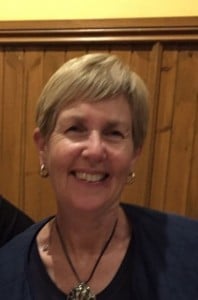Helen, 66 Church co-ordinator, retired teacher & active mother living with brittle bones, SYDNEY
 When celebrating her 50th birthday, Helen, 66, Sydney, underwent a bone mineral density test.
When celebrating her 50th birthday, Helen, 66, Sydney, underwent a bone mineral density test.
Given her strong family history of osteoporosis – Helen’s two sisters have been diagnosed with the disease – she was determined to take every precaution possible to protect against the debilitating bone disease.
Fortunately for Helen, this initial test identified no signs of osteoporosis.
Two years later, however, Helen underwent a second bone mineral density test, which revealed severe bone deterioration, and a subsequent diagnosis of osteoporosis.
This is Helen’s story.
At 52 years of age, two years post- her first bone mineral density test, Helen visited her GP for a regular check-up, and much to her surprise, was referred for another bone mineral density test. On this occasion, she was diagnosed with osteoporosis in her spine, and osteopenia (a precursor to osteoporosis) in her hips.
“My diagnosis of osteoporosis came as a quite a surprise, particularly given I had been granted a clean bill of health two years earlier, with regard to my bones,” Helen said.
Despite having always led a healthy lifestyle, the retired teacher, “a lover of all things sports and the outdoors” who travels the world with her orienteering and bike-riding group, was no stranger to osteoporosis, for both of her sisters have been diagnosed with the disease.
“I absolutely love sport – especially orienteering and cycling.
“I ride every Tuesday with a group and I orienteer all over Sydney each Wednesday during summer,” said Helen.
Since her diagnosis of osteoporosis however, Helen has been careful to minimise her risk of sporting-related injuries. She has nonetheless, still sustained a number of fractures.
Helen’s first fracture occurred in 2004, when she broke her foot while walking through “an unlit, uneven alleyway in Hunters Hill,” Sydney. Although suspecting she may have sprained her foot, Helen chose to attend a teacher’s event that evening. It was only later that evening, that her two daughters suggested she have her foot examined.
“My daughters played car tag with me that evening, and the ensuing few days, transporting me to and from St Vincent’s Hospital in Sydney.
“After arriving at hospital, I was told I had broken my foot and would need to wear a cast for the next six weeks.
The most memorable of Helen’s fractures occurred in Denmark in 2008, when she tripped over a tree root in a forest and broke her wrist while orienteering.
She held onto her wrist for the remainder of the course, and following completion, was rushed to the closest hospital in Aarhus, where her wrist was placed in a soft half cast. Upon her return to Sydney, the cast was removed and replaced with a full plaster cast for a further six weeks.
Since fracturing her wrist, Helen has also fractured her elbow and big toe, both of which occurred when she was bike riding.
Helen maintains her positive attitude and active lifestyle have played an important role in her recovery from fractures.
“Post diagnosis life hasn’t changed much at all,”Helen said.
“I continue to walk about three kilometres a day, and I believe my regular exercise and active lifestyle has helped to manage my brittle bones,” said Helen.
“If I performed no exercise at all, perhaps my bone health would be much worse.”
Nonetheless, Helen concedes her fragile bones are of ongoing concern.
“Nowadays, I’m much more aware of protecting my bones. If I’m going down stairs for example, or I’m in a hurry, I will hold onto the handrail.
“I also have no plans to go rock climbing or sky diving now,” Helen said.
“I just choose not to take any unnecessary risks.”
Helen urges all Australians to consider the health of their bones, and for anyone aged 50 and above, to undergo a bone mineral density test.
She is a strong advocate for the ‘Know Your Bones’ health assessment – a new, Australian, online fracture risk self-assessment tool developed by the Bone Alliance – a joint initiative of Osteoporosis Australia and the Garvan Institute of Medical Research.
“People get sent for bowel cancer and breast cancer scans all the time. I don’t see why bones should be any different.
“This new, online tool represents a crucial step in identifying fracture risk and the importance of maintaining healthy bones,” said Helen.
“If you’re not proactive, then you’re at risk of fracture and re-fracture.
“Get to know the health of your bones. Jump online, complete the five-minute-long Know Your Bones health assessment, print out your report and take it to your GP for further discussion and investigation, if required,” Helen said.
